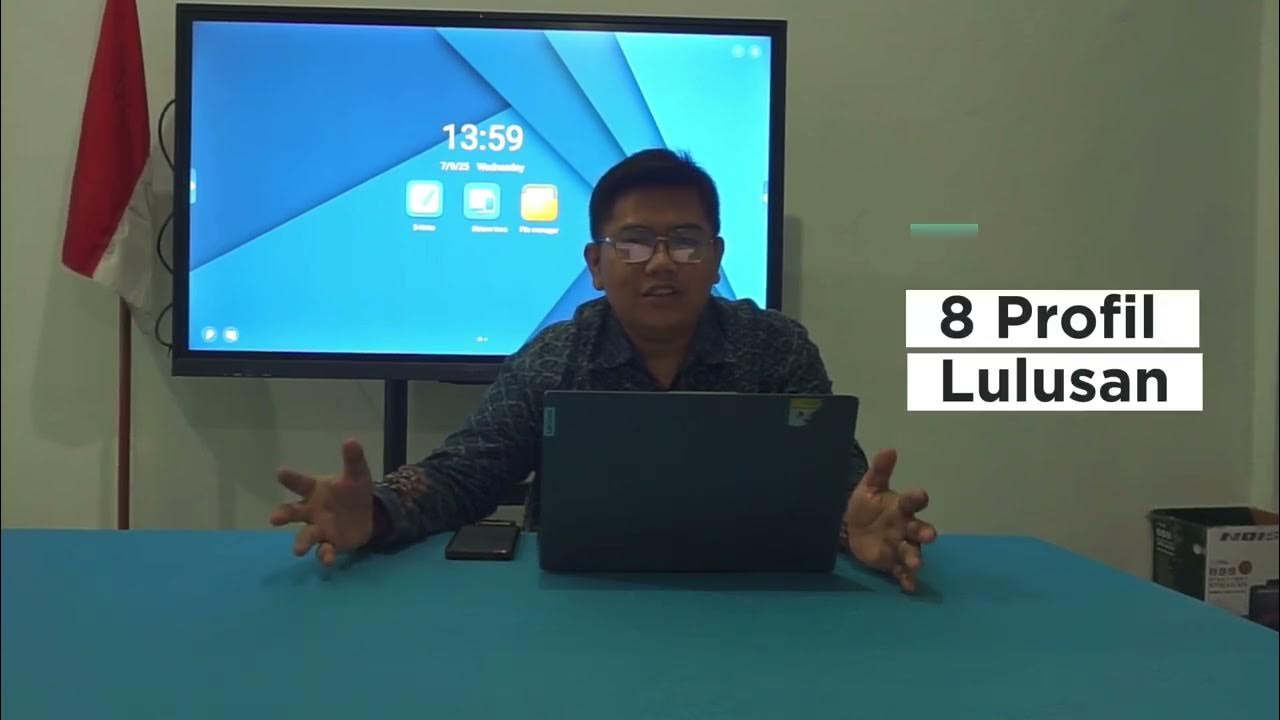PAI KELAS XI BAB 1 | BERFIKIR KRITIS DAN MENCINTAI IPTEK
Summary
TLDRThis educational video discusses critical thinking and the importance of science and technology, as outlined in the Islamic education curriculum for grade 11. It explores the teachings from Surah Ali Imran (190-191) and related Hadith, emphasizing the importance of contemplating the creation of the heavens and earth. Viewers are encouraged to engage in deep reflection, fostering a deeper understanding of Allah’s signs. The video also explains the Islamic perspective on critical thinking, highlighting the limits of human reasoning and the need for balanced, objective thought in addressing life's challenges.
Takeaways
- 😀 Critical thinking is essential in understanding the universe and is emphasized in Islamic teachings through reflection on the natural world.
- 😀 The Quran (Surah Ali Imran 3:190-191) encourages believers to reflect on the creation of the heavens and earth as signs of Allah's greatness.
- 😀 The concept of **Ulil Albab** refers to those with intellect and wisdom who engage deeply in thought and reflection.
- 😀 The alternation of day and night, the movement of celestial bodies, and the order of the natural world all serve as reminders of Allah’s power.
- 😀 The hadith stresses that while we can reflect on Allah's creations, we should not attempt to comprehend His essence, as it is beyond human understanding.
- 😀 Islamic teachings guide believers to use their intellect to explore creation, but to recognize the limits of human understanding of the divine.
- 😀 The pursuit of knowledge (Ilmu) and the love for science and technology (IPTEK) are encouraged in Islam as ways to understand the natural world.
- 😀 **Tafakkur** (reflection) on the signs of creation is a key principle in Islam, leading to a deeper appreciation of Allah’s creation.
- 😀 The importance of balanced thinking is emphasized—believers are encouraged to think critically while being aware of the limitations of human reason.
- 😀 Islamic teachings promote intellectual humility, urging believers to reflect on their surroundings and knowledge, but to avoid overstepping in their understanding of the divine.
Q & A
What is the main topic of the video?
-The main topic of the video is about critical thinking and the spirit of loving science and technology (IPTEK) in the context of Islamic religious education, based on the 'Kurikulum Merdeka' curriculum for 11th-grade students.
What are the two key topics discussed in the video?
-The two key topics discussed in the video are 'critical thinking' and 'loving science and technology' (IPTEK), with references to Quranic verses and Hadith related to these concepts.
Which Quranic verses are referenced in relation to critical thinking?
-The Quranic verses referenced in relation to critical thinking are from Surah Al-Imran, verses 190-191.
What is the primary message of Surah Al-Imran, verses 190-191?
-The primary message of Surah Al-Imran, verses 190-191, is that the creation of the heavens, the earth, and the alternating of day and night are signs of Allah's greatness, and those who reflect on these signs with critical thinking are those who possess wisdom (Ulil Albab).
How does the video suggest we approach the natural world according to the Quran?
-The video suggests that we should reflect deeply on the creation of the natural world—its order, cycles, and events—as a way to understand and appreciate Allah's power, wisdom, and purpose in creating it, and not view these phenomena as mere random occurrences.
What does the term 'Ulil Albab' refer to?
-The term 'Ulil Albab' refers to individuals who possess intellect and wisdom, who reflect on the signs of Allah in creation, and who approach life with a clear, pure heart, thinking critically and deeply about the world around them.
What is the significance of the Hadith mentioned in the video?
-The Hadith cited in the video emphasizes the importance of critical thinking about Allah's creations, but also warns against delving into contemplating the essence of Allah's being, as it is beyond human comprehension and can lead to confusion and misguidance.
What are the limits of critical thinking according to the video?
-According to the video, critical thinking has limits—it should be focused on the observable world and its phenomena, but not on the essence or nature of Allah, which is beyond human capacity to understand.
What is the role of knowledge in Islamic thought as described in the video?
-In Islamic thought, knowledge begins with critical thinking and is seen as a way to understand the natural world, ourselves, and our relationship with Allah. The video stresses that true knowledge comes from reflecting on the signs of Allah, as revealed through the Quran and the teachings of the Prophet.
How does the video describe the concept of 'thinking critically'?
-Thinking critically, as described in the video, involves using one's intellect to reflect deeply on the signs of Allah in the world. It means being objective, balanced, and thoughtful in one's approach to understanding complex issues and avoiding rash judgments or biases.
Outlines

This section is available to paid users only. Please upgrade to access this part.
Upgrade NowMindmap

This section is available to paid users only. Please upgrade to access this part.
Upgrade NowKeywords

This section is available to paid users only. Please upgrade to access this part.
Upgrade NowHighlights

This section is available to paid users only. Please upgrade to access this part.
Upgrade NowTranscripts

This section is available to paid users only. Please upgrade to access this part.
Upgrade NowBrowse More Related Video

PAI KELAS XI BAB 1 (part 2) | BERFIKIR KRITIS DAN MENCINTAI IPTEK

Pengenalan Materi Informatika - Kelas X Semester Ganjil

BERPIKIR KRITIS &CINTA IPTEK

Teaching and Learning with Technology (An Introduction) - Module 1 Lesson 1

MPLS | SMA Negeri 4 Surabaya | Kurikulum Sekolah

"Matatag K-10" curriculum, sisimulang ipatupad sa 20 eskuwelahan sa Setyembre | UB
5.0 / 5 (0 votes)